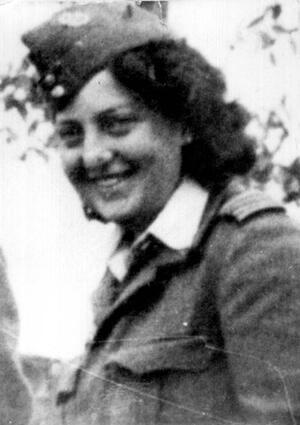A Tradition of Taking Risks
This month our Rising Voices Fellows are examining how their Jewish and feminist identities intersect. Be sure to check the JWA blog each Tuesday for a new post from our fellows—and check out the great educational resources provided by our partner organization, Prozdor.
In traditional society, men are seen as the risk takers, while women are supposed to be docile homemakers. When women step up to the plate, it stands out. To me, the women who bravely put aside their fears and take matters into their own hands are the ones who make the difference and are role models for all people.
In the Torah, there is a story of two women, Shifra and Puah, and the risks they took to save the lives of some children in Egypt. These midwives worked for the Israelites and took orders from Pharaoh, who knew the two of them and specifically told them to kill any male children born to Hebrew mothers, but they chose to not listen to him. It’s not clear if these two women were part of the Jewish people or if they were Egyptians. Still, their story takes place for a reason, not just to explain how Moses survived, but also to bring a lesson to future Jews about courage and the impact of the risks they take.
No one goes around ordering all the male children to be killed today, but there have been horrors like Shifra and Puah’s situation in recent years. Seventy-five years ago, Hitler was rising in power and told people how the Jews must be eradicated from Europe. One by one, and then all at once, Jews were removed from their homes, forced into ghettos and sent to concentration camps until the Final Solution could wipe them out.
A few brave people, however, risked it all to save just a few lives, just like Shifra and Puah. Hannah Senesh was a poet. After a childhood in Hungary, she lived on the Mediterranean in what is now Israel, on a kibbutz that still stands today. During the course of WWII, she trained and became a paratrooper, one of the few women to do so.
One day in March of 1944 she left Palestine for Hungary, home of her youth, on a mission to save children there. She was caught a few hours after she arrived. Still, she kept true to her values, never divulging information to the Nazis. She believed in the goodness of what she was doing, saving children and ending the war. Instead of keeping herself safe while others perished, she fought for justice, tzedek.
I look at these three women, and am baffled and awed by their commitment to their causes. Unlike Shifra, Puah and Hannah, I haven’t taken any hugely dangerous risks—no military service on my record—but I have made choices that put me into territory where I felt uncomfortable. Two summers ago, I decided to go to the URJ Kutz Camp, NFTY’s Leadership Camp. The camp, for high school students only, allows participants to chose a major. Deciding on Torah Corps, I could not have been more excited to spend a month studying liturgy and siddurim of different denominations and eventually write and lead a service for the whole camp. Then, a few weeks before the session began, panic set in; I did not know anyone else going to camp.
In the end, there were a few tears, a few meals where I didn’t know whom to sit next to, but none of that matters now. The summer could have turned out to be horrible, but Kutz remains one of the most important decisions I made in my life. I met some of my best friends, danced at song session until my feet hurt and I lost my voice, and figured out where I want to go on my Jewish journey. The knowledge I gained at Kutz I use every week in the Hebrew school at my synagogue, for which I am a madricha (teaching assistant). Moreover, it solidified for me that I am a Jewish leader and I aim to become a Jewish professional, to inspire the next generation of Jewish youth in the same way the faculty at Kutz inspired me.







